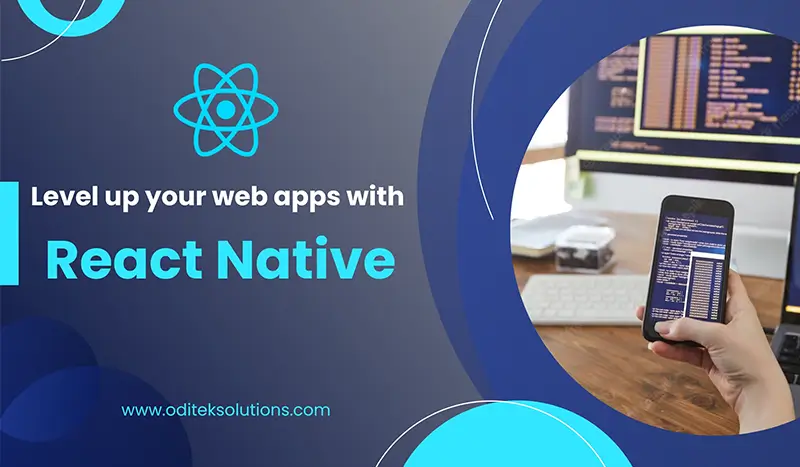In the dynamic world of web development, it’s essential to stay ahead of the curve and leverage the latest technologies to deliver exceptional user experiences. One such technology that has gained immense popularity is React Native. Initially designed for mobile app development, React Native has now expanded its horizons to include web development as well. This evolution has opened up a whole new realm of possibilities for developers and businesses alike. In this blog post, we will explore the best practices and advantages of using React Native web development, shedding light on how this powerful framework can elevate your web applications to new heights.
Understanding React Native for Web
React Native, built on top of ReactJS, is a JavaScript framework developed by Facebook. Originally created for building native mobile applications, React Native has now extended its capabilities to web development. With React Native for Web, developers can create highly responsive and feature-rich web applications using the same codebase as their mobile counterparts. This approach not only saves time and effort but also allows for seamless synchronization between web and mobile platforms.
React Native for web development shares many similarities with ReactJS for web development, as both utilize the same declarative syntax, component-based architecture, and virtual DOM. However, React Native for web comes with additional benefits, such as platform-specific components, hot reloading, and improved performance. These advantages make React Native for web an ideal choice for organizations seeking to create cross-platform applications efficiently.
Best Practices for React Native Web Development
To make the most out of React Native for web development, it’s crucial to follow the best practices that have emerged over time. These practices ensure efficient development, enhanced performance, and maintainable code. Let’s delve into some of the key best practices for React Native web development:
Component Reusability
React Native’s component-based architecture encourages code reusability. By designing reusable components, developers can streamline development, minimize redundancy, and maintain consistency throughout the application.
Responsive Design
With a growing number of users accessing websites from different devices and screen sizes, it’s vital to ensure responsive web design. React Native’s Flexbox layout system and responsive design techniques allow developers to create adaptable user interfaces that look great across various devices.
Optimal Performance
Performance plays a crucial role in web development. To optimize performance in React Native web apps, developers should utilize techniques such as code splitting, lazy loading, and image optimization. Additionally, implementing memoization and avoiding unnecessary re-renders can significantly improve application speed.
Effective State Management
React Native web development benefits from efficient state management. By adopting state management libraries like Redux or MobX, developers can centralize and manage the application’s state, leading to better code organization and improved performance.
Accessibility
Building inclusive web applications is essential. Developers should follow best practices for web accessibility, such as using semantic HTML tags, providing alt attributes for images, and ensuring keyboard navigation compatibility. React Native provides accessibility features out of the box, making it easier to create accessible web applications.
Testing and Debugging
Thorough testing and debugging are critical for ensuring the quality of React Native web applications. Employing tools like Jest, React Testing Library, and debugging tools provided by React Native helps identify and fix issues early in the development process.
Code Optimization
Optimizing code is essential for enhancing performance and maintainability. Techniques like code splitting, tree shaking, and optimizing rendering cycles can minimize bundle sizes and improve application speed.
Advantages of React Native for Web Development
Code Reusability
React Native allows developers to reuse a significant portion of code between web and mobile platforms, resulting in reduced development time and efforts.
Cross-Platform Compatibility
With React Native for web, you can create applications that run seamlessly across various platforms, including web, iOS, and Android. This versatility helps businesses reach a broader audience without the need to develop separate codebases for each platform.
Faster Development
React Native’s component-based approach, combined with its extensive library of pre-built UI components, accelerates the development process. This speed advantage is particularly valuable for organizations aiming to deliver web applications swiftly.
Improved Performance
React Native’s efficient rendering capabilities, coupled with its use of the native components for web, ensure better performance for web applications. This performance enhancement contributes to an enhanced user experience and higher user engagement.
Easier Maintenance
By sharing a single codebase between web and mobile applications, maintenance becomes more straightforward. Any changes or bug fixes made to the shared codebase automatically apply to all platforms, reducing maintenance efforts and potential inconsistencies.
Rich Ecosystem
React Native has a vast and thriving ecosystem that offers numerous libraries, tools, and community support. This ecosystem facilitates developers in finding solutions, addressing challenges, and staying updated with the latest trends in web development.
Conclusion
Leverage the power of React Native for web development with OdiTek Solutions, a leading custom software development company. Our expert team specializes in React Native web development, employing best practices to create cutting-edge, high-performance web applications. With our expertise, your business can benefit from code reusability, cross-platform compatibility, faster development, improved performance, and easier maintenance. Partner with us to harness the advantages of React Native and create exceptional web experiences tailored to your specific business needs.
Choose OdiTek Solutions for your React Native web development requirements, and together, we’ll build remarkable web applications that leave a lasting impact.







